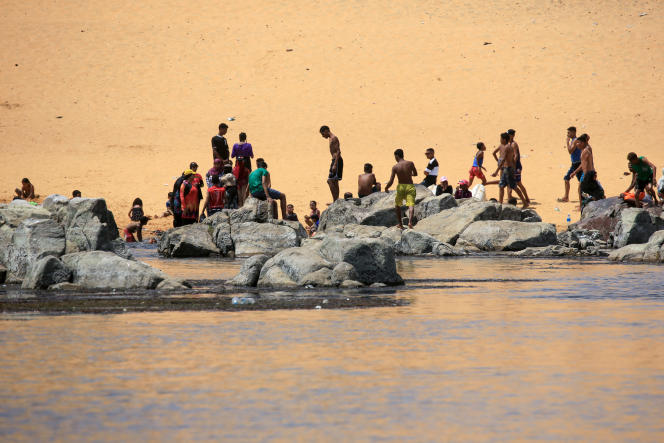Thousands of Sudanese have found refuge in Aswan, helping to revitalize the tourist season in this southern Egyptian city where they try to forget the horrors of war.
Hicham Ali, 54, arrived in Aswan after a journey of a thousand kilometers between Khartoum, the Sudanese capital plagued by fighting, and the Egyptian border to the north. After finding an apartment to accommodate his family, this former civil servant now wants his children to enjoy their new city. “I came with my family to spend a nice day here together”, he says from the terrace of an inn which, during the high tourist season, in winter, attracts a large number of foreign visitors. He hopes that this day will allow his loved ones to“forget the war, the bombs, the air raids and the shootings”he confides, his voice covered by the bursts of laughter from his children.
Since the start of the war on April 15, between two generals fighting for power, more than 310,000 people have, like Hicham Ali, found refuge in Egypt. On the other side of the border, many people wait, stopped en route by Egypt’s sudden decision in July to reimpose visas on all Sudanese fleeing the war. Previously, women, children and men over 50 crossed without any formalities.
Zeinab Ibrahim, 30, managed to cross three months ago. Before that, she spent two months with her family holed up in their Khartoum apartment for fear of airstrikes, artillery fire and street fighting. “I was pregnant and there was no longer any hospital to give birth”she told AFP, while millions of people no longer have access to care, the war having seriously damaged the already fragile Sudanese health system.
Once in Egypt, many refugees went to Cairo, while others remained in Aswan, the first major Egyptian city coming from Sudan, 300 km from the border. The two countries share the same language and much of their history since the times of the pharaohs. Before the war, more than 4 million Sudanese already lived in Egypt, according to the UN. Most of the new arrivals aspire to settle there permanently, far from their country, which they cannot imagine recovering for decades.
Racism and discrimination
In Aswan, every winter, residents see waves of Egyptian and foreign tourists arrive who come to discover the extremely well-preserved pharaonic sites in the surrounding area, relax on the banks of the Nile and enjoy the mild temperatures. But they did not expect such an influx of refugees, nor the opportunities they brought.
At the beginning of September, when the crushing summer heat had driven away Egyptian visitors, the boat captains had to return to service. They weighed anchor again to skim the winding Nile, speakers blasting music at full volume, between the Nubian islands that dot its course. On a sandy shore where guides recommend travelers to swim between sips of Nubian coffee, families happily cool off. “Since the war and the arrival of our Sudanese brothers, we have resumed our activities and we have more work”, rejoices Mahmoud Al-Aswany, 19, perched on the deck of the felucca on which he has been sailing for five years. A godsend in this country which is going through its worst economic crisis, with inflation at its highest historical level.
But not all Sudanese are welcomed in the same way. In Cairo, they complain of discrimination, racism and crooked landlords who inflate rents. In Aswan, where Nubian communities have lived for millennia straddling the border, the Sudanese found volunteers waiting for them with hot meals when they arrived. “Aswan is a beautiful city and its people are kind”repeats Hicham Ali.
But beyond small private initiatives, refugees in need are often left to their fate. Egyptian authorities do not allow UN agencies and international NGOs to establish camps to accommodate migrants, with Cairo arguing that in exchange, new arrivals are not deprived of the right to work or move freely.
